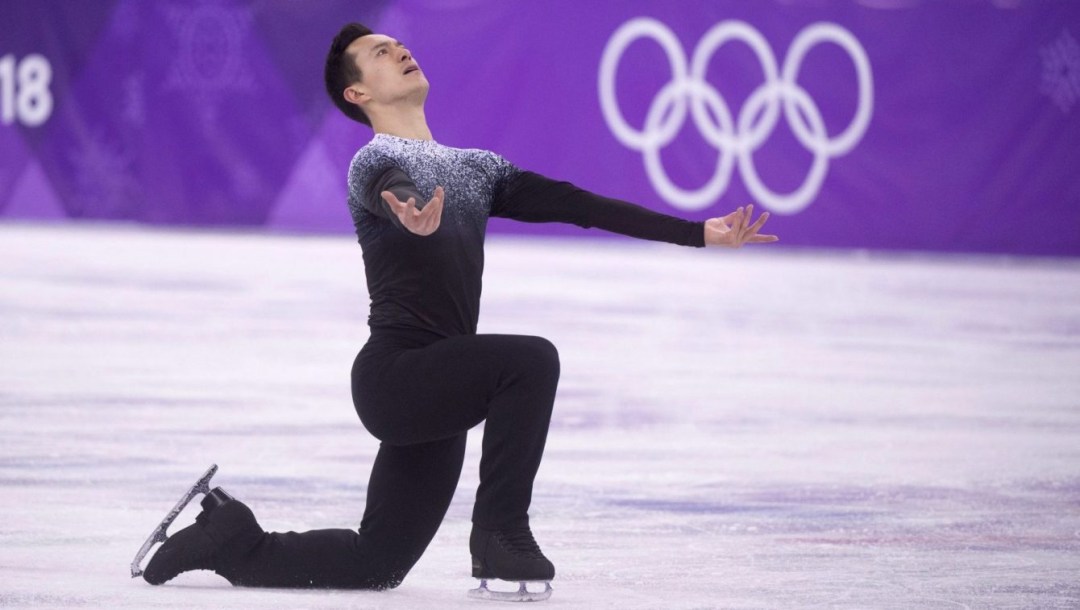Chan makes his way into final flight for his final Olympic skate
If there is one thing Patrick Chan might wish he could re-do in his illustrious career, it would be how he learned to do a triple Axel.
“I’ve been blessed with good skating skills but not with triple Axel skills,” he said after falling on the jump once again in his short program during the men’s singles event.
This time the mistake came after he had landed both a quad toe and a triple Lutz-triple toe combo. It was a huge factor towards him earning just 90.01 points in the short program, leaving him in sixth place. That will ensure he is part of the final flight for his final Olympic skate, but there is a large point gap between him and the podium.

Team Canada’s Patrick Chan skates in the men’s short program at the PyeongChang 2018 Olympic Winter Games in Korea, Friday, February 16, 2018. THE CANADIAN PRESS/HO – COC – Jason Ransom
Leading the way is reigning Olympic champion Yuzuru Hanyu. The Japanese star hadn’t competed since he sustained an ankle injury while practicing a quad Lutz in early November. But he was stellar on Friday, earning 111.68 points, just under his world record mark, to receive a shower of Winnie the Pooh stuffed animals from his dedicated fan base.
His training mate, two-time world champion Javier Fernandez of Spain, is second with 107.58 points. Both men are coached in Toronto by Canada’s two-time Olympic silver medallist Brian Orser. Another Japanese skater, Shoma Uno is third with 104.17 points. China’s Boyang Jin is less than a point back.
Making his Olympic debut, Canada’s number two man, Keegan Messing, broke into the top 10 with a short program that included a quad toe-triple toe combo. But he was also unable to land the triple Axel.
In perhaps the biggest surprise of the day, American Nathan Chen, widely considered a pre-Games favourite because of his ability to perform multiple different quads, could not complete any of his three jumping passes successfully and finds himself in 17th place.

Team Canada’s Patrick Chan , next to his coach Ravi Walia, reacts after receiving his marks for the men’s figure skating short program at the Pyeonchang Winter Olympics, Friday, February 16, 2018 in Gangneung, South Korea. THE CANADIAN PRESS/Paul Chiasson
When Chan saw the replay of his Axel while sitting in the kiss and cry, he knew immediately where it all went wrong.
“My arms are just so fast, my leg’s not even coming through and my arms are already up here ready to rotate,” he said. “So it’s just a lack of patience and trust on that left leg before takeoff. And I know. I have that conversation in my head going into it.”
But in the moment, his body just fell back to bad habits.
“And I have a lot of bad habits when it comes to the triple Axels,” said Chan. “Now I know if I ever teach someone a triple Axel, or even an Axel as a young skater, to really pay attention and make sure that I’m giving the right cues for when they’re doing a triple Axel.”

Team Canada’s Patrick Chan competes in the men’s figure skating short program at the Pyeonchang Winter Olympics Friday, February 16, 2018 in Gangneung, South Korea. THE CANADIAN PRESS/Paul Chiasson
When Chan left Sochi 2014 with a silver medal, he was haunted by his mistakes that cost him the gold for a couple of years. But in the last year he has come to realize that what he does at the Games won’t be the only thing that defines him as a person.
“I think we forget that just because of five rings, we think it’s going to determine the rest of our lives. We have amazing skates, we have bad skates,” he said. “I have 40, 50 years to prove I’m better at something else. I think I’ve done quite well so far and tomorrow is another day to prove that I am one of the best.”
But despite knowing that it will be his last competitive performance on Olympic ice, he’s not making a huge deal of it.
“It’s kinda funny that we’re like ‘oh my God, it’s the day, it’s going to be the last skate’ but I’m going to still be skating after this. I’m still going to be around. I’m not falling off the face of the Earth,” he said. “I’m still going to go for a clean long program, still going to go for my best performance.”


